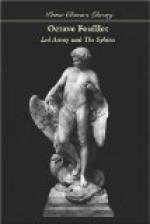“Parbleu! if that’s what troubles you—”
“Of course it is; you must admit that it is not natural. My wife is pretty; why don’t they pay attention to her as well as to other ladies? There is something suspicious there!”
Fortunately, and to the great advantage of the social question, all the young women who reside in turn at the chateau are not guarded by dragons of that caliber. A few even, and among them two or three Parisians out for a holiday, display a freedom of manner, a love of pleasure, and an exaggerated elegance that certainly pass the bounds of discretion. You are aware that I have not the highest opinion of that sort of behavior, which does not answer my idea of the duties of a woman, and even of a woman of the world; nevertheless, I take side without hesitation with these giddy ones; and their conduct even appears to me the very ideal of truth and sincerity, when I hear nightly certain pious matrons distilling against them, amid low and vulgar gossip, the venom of the basest envy that can swell a rural heart. Moreover, it is not always necessary to leave Paris in order to have the ugly spectacle of these provincials let loose against what they call vice, namely, youth, elegance, distinction, charm—in a word, all the qualities which the worthy ladies possess no more, or have perhaps never possessed.
Nevertheless, with whatever disgust, these chaste vixens inspire me for the virtue they pretend to uphold (Oh, virtue! how many crimes are committed in thy name!), I am compelled, to my great regret to agree with them on one point, and to admit that one of their victims at least gives an appearance of justice to their reprobation and to their calumnies. The angel of kindness himself would hide his face in presence of this complete specimen of dissipation, of turbulence, of futility, and finally of worldly extravagance that bears the name of Countess de Palme, and the nickname of the Little Countess; a rather ill-fitting nickname, by the way, for the lady is not small, but simply slender and lithe. Madame de Palme is twenty-five years of age; she is a widow; she spends the winter in Paris with her sister, and the summer in an old Norman manor-house, with her aunt, Madame de Pontbrian. Let me get rid of the aunt first.
This aunt, who is of very ancient nobility, is particularly noted for the fervor of her hereditary opinions, and for her strict devotion. Those are both claims to consideration which I admit fully, so far as I am concerned. Every solid principle and every sincere sentiment command in these days a peculiar respect. Unfortunately Madame de Pontbrian seems to be one of those intensely devout persons who are but very indifferent Christians. She is one of those who, reducing to a few minor observances, of which they are ridiculously proud, all the duties of their religious or political faith, impart to both a harsh and hateful appearance, the effect of which is not exactly to




